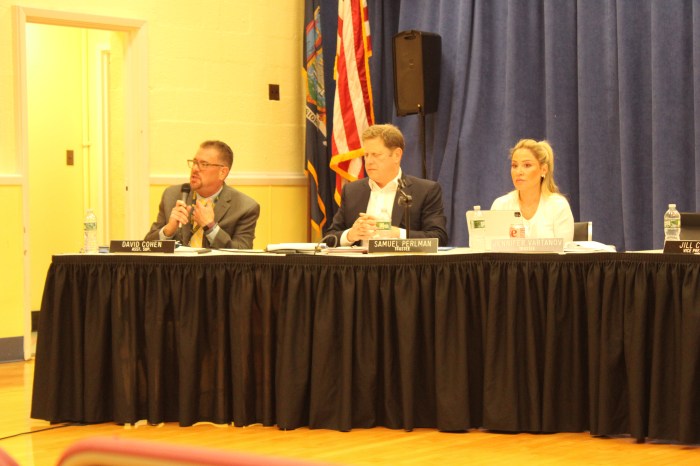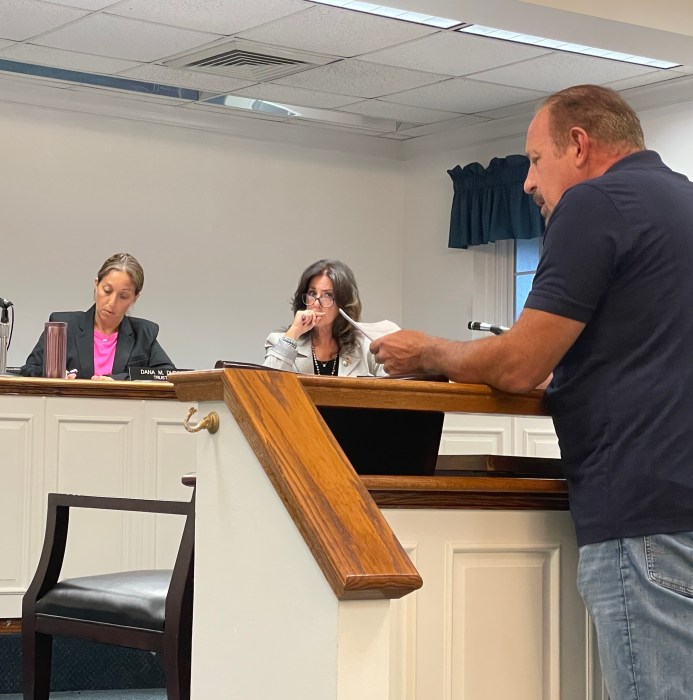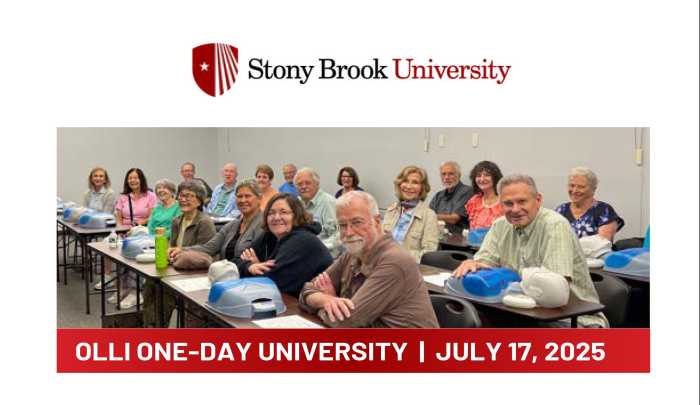Edmund Morris, Pulitzer Prize-winning author of the 1979 book The Rise of Theodore Roosevelt, and its much lauded sequel in 2002, Theodore Rex, returned to Oyster Bay on Saturday, Feb. 19, at the Christ Church Community Room to speak with eloquence about his recently published and final volume on TR, Colonel Roosevelt (Random House).
Every seat in the community room and every inch of aisle space were filled with local historians, students, and readers of history to hear about the last decade of TR’s life outside of his White House years.
Mr. Morris, accompanied by his wife and fellow biographer Sylvia Jukes Morris, returned to Oyster Bay, where previously, countless hours, days and months of time had been invested in historic research for The Rise of Theodore Roosevelt.
The day was windy, which inspired Mr. Morris to recall from his journal a similarly windy day 36 years earlier, sitting at Sagamore Hill researching this powerful influence of the early 20th century. On Saturday, however, Mr. Morris held the crowd on his every word, wanting to hear the story of the man regarded to be one of the greatest American presidents, and at the time of 1910, known as “The Most Famous Man in the World.”
TR, at the time, captured the hearts of America and the nobility of Europe while at the same time, generating fear and apprehensiveness among his fellow Republicans with his progressive views on business regulation, tariffs and social reforms. Mr. Morris noted TR’s keen sense of history and the realization of his own role in it, writing some 150,000 letters during his lifetime, even signing his name Theodore Roosevelt with grand flourish in letters to family, when discussing politics, policy or world events, as if knowing that history would one day examine them closely.
Mr. Morris noted that TR is the only one of our great presidents whose “greatness” increased out of office. Saying that TR referred to himself as Colonel Roosevelt and never as President during this time, Mr. Morris recalled how Colonel Roosevelt was asked by President Taft to tour Europe and to represent America at various events, including the funeral of England’s King Edward VII. He did this with no hesitation, while watching Taft dismantle many of his programs and progressive reforms that they had worked on together, and which he thought would continue out of office by his self-picked successor.
As “crowned heads vied to put him up in their palaces,” TR conversed fluently with European nobility, and was not shy in offering advice on cultural and social events that pertained to their respective countries. He was educated and well versed in European culture and history, something that when asked, Mr. Morris noted today’s presidents are often lacking in with the same level of understanding.
Mr. Morris describes the book opening with TR at age 50 on African safari in what is today Kenya, with his 19-year-old son Kermit, just seven weeks from walking away from the White House in April 1909. Mr. Morris said that the “calendar does not matter much in the land of perpetual summer, with equal days and nights.” Financed by the Smithsonian to obtain samples of animals and flora, we find TR preparing detailed drawings of his prizes from the daily, arguably brutal hunting episodes, described by some at the time as “butchery.”
Mr. Morris’ reading continued with TR’s trip to Europe on official business, and later to Oyster Bay and other parts. Colonel Roosevelt continues with politics, the lure, request to, and desire to run for a third term (TR served seven and a half years, finishing out McKinley’s term after he was assassinated in 1901 and was elected to his own term in 1904). The book and reading continued with fascinating accounts of his political battles with the established Republican party, his assassination attempt in Milwaukee in 1912, where after being shot, he kept a speaking appointment, and read for 45 minutes orating, “It takes more than that to kill a Bull Moose”, the name of the third-party ticket of his failed 1912 campaign.
Mr. Morris can tell a story like no other. His writing on TR’s 10 years of life after his presidency, his interactions with his family and love for Sagamore Hill are a must for every student of history, especially those interested in the complexities that describe and define our presidents. Though not referenced by Mr. Morris in his reading, there is an account in the book about the service on the LIRR Oyster Bay branch in 1910, which is still pertinent today for those riders on this line. Instead of taking the train from Oyster Bay back to the city, TR suggested that his visitor, Mark Sullivan, the editor of Collier’s Weekly, “walk across the four miles of fields to the Syosset branch on the main line” for better service.
It’s unfortunate that TR’s early and untimely death in 1919, six months after his beloved son Quentin was killed in WWI, cut short the influence of this great man on the history of the world. After reconciliation with the Republican Party, it surely could be speculated that TR would have been nominated in 1920 to represent the GOP, and would have won in the 1920 landslide that gave us Warren Harding.
Mr. Morris’ lecture and reading from the book, Colonel Roosevelt, magnificently describes those times of the early 20th century, the richness and bitterness of TR’s last 10 years of life, and freshly paints a description of a complex man, with an unfettered desire for adventure and fairness.
When asked in a question-answer period, Mr. Morris noted that TR’s “progressiveness” of the early 20th century was in no way to be confused with today’s term of liberalism. TR was simply a deep thinker, scholar and well-read historian, who read a book a day with a great vivid photographic memory, who wanted to learn about foreign cultures, science and who wanted to enhance the benefits of what was becoming attainable to a larger segment of our society. That’s not too bad a description for a world leader for those times or even today and who was widely recognized as being ahead of his time, especially in the years following his presidency.

































